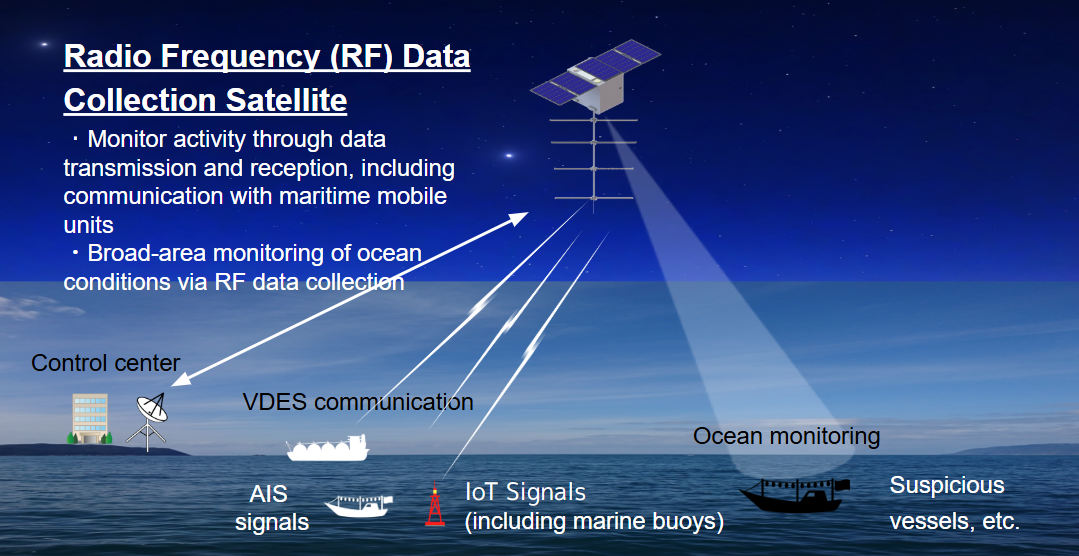Tokyo, Japan, December 16, 2024 – ArkEdge Space Inc. (“ArkEdge Space”), a Japanese space startup based in Tokyo that provides comprehensive solutions from planning and design to mass production and operation of micro-satellite constellations, is pleased to announce its selection as a project provider for the Japan Aerospace Exploration Agency’s (JAXA) Space Strategy Fund Initiative on November 29, 2024.
Under the project theme of “Accelerating the Commercial Satellite Constellation Development,” ArkEdge Space will officially launch this project and lead the development of multi-purpose satellite constellations equipped with sensors to expand data collection across multiple wavelengths.
In this project, ArkEdge Space focuses on advancing the societal implementation of sensors that extend data capabilities across multiple wavelengths. By developing multi-purpose satellite constellations with advanced functionalities, including the reception of various signals and data related to [1] RF/AIS/IoT and [2] VDES transmission and reception, the project will enable seamless integration with different types of satellites. These innovations are expected to significantly enhance maritime safety through improved vessel tracking and comprehensive ocean monitoring, while driving the digital transformation of maritime industries.
Furthermore, the project will establish a robust foundation for commercial satellite constellations by developing and scaling the production of small satellites essential to these efforts. Through these, we seek to establish a commercial satellite constellation platform for both security and civil use.
[1] RF: Radio Frequency, AIS: Automatic Identification System, IoT: Internet of Things
[2] VDES: VHF Data Exchange System; maritime two-way communication system
■Project Overview
Name: Space Strategy Fund “Accelerating Commercial Satellite Constellation Deployment” Program
Technology Development Theme: “Building Multi-purpose Satellite Constellations(Development of Satellite Constellations Equipped with Sensors to Expand Diverse Wavelength and Frequency Data)”
Reference URL: https://fund.jaxa.jp/techlist/theme2/
■Project Background
In recent years, as the maritime security environment has become increasingly critical, it has become necessary to enhance maritime domain awareness (MDA) in the seas around Japan and along the sea lanes of communication through the use of space technology. While it is currently possible to obtain ship navigation information through the Automatic Identification System (AIS), which monitors ship movements, its limitations are becoming apparent. AIS installation is mandatory only for large ocean-going vessels, leaving out fishing boats and small vessels unless installed voluntarily. In addition, illegal activities such as disabling AIS signals to obscure vessel locations or falsifying signals to fabricate location data have become increasingly prevalent, and it raised concerns about the liability of the AIS data source for MDA. This has also led to global discussions about the adequacy of AIS to ensure safe maritime navigation and to detect threats and risks on the oceans.
Against this backdrop, there is a growing global interest in innovative methods for maritime monitoring that do not depend solely on AIS signals. By utilizing data derived from electromagnetic waves across multiple frequency bands and IoT sensors, these approaches promise enhanced reliability and a broader understanding of oceanic conditions. Moreover, current AIS technology is constrained by several limitations, including low communication speeds, one-way data transmission, and restrictions on the type of information it can send—confined mainly to vessel identification numbers and navigation speeds. These shortcomings prevent AIS from supporting more advanced maritime operations, such as flexible data transmission and the integration of applications to optimize workflows and boost operational efficiency.
In response, the concept of a two-way digital communication system, VDES was developed. This system enables a two-way digital communication system that will enhance and accelerate information exchange, building on the capabilities of conventional AIS. VDES also enables signal relaying via satellite, further expanding its potential. At the World Radio Communication Conference (WRC) in November 2019, the necessary frequency allocation for VDES signals in maritime communication were finalized[3]. Additionally, in February 2022, the ITU-R (International Telecommunication Union Radiocommunication Sector) Recommendation M.2092-1 established the core technical standards for VDES [4].
Currently, AIS is mandated under the SOLAS Convention (International Convention for the Safety of Life at Sea) for large commercial vessels. However, with anticipated amendments around 2028, this requirement is expected to transition to a choice between AIS or VDES systems. By leveraging VDES communication capabilities, the system is expected to contribute to more reliable collection of vessel information, further enhancing maritime safety and operational efficiency.
[3] https://www.soumu.go.jp/menu_news/s-news/02kiban10_04000074.html
[4] https://www.itu.int/rec/R-REC-M.2092-1-202202-I/en
■Reference: Related ArkEdge Space Initiatives
“Key and Advanced Technology R&D through Cross Community Collaboration Program (K Program): Development and Demonstration Project of Maritime Situational Awareness Technology Based on a Constellation of VDES Satellites”
ArkEdge Space’s VDES project was selected by the New Energy and Industrial Technology Development Organization (NEDO) on March 17, 2023. In collaboration with IHI Corporation and LocationMind Inc., we are developing and demonstrating VDES technology that enables two-way communication for ships and maritime operations. This includes the development of micro-satellites and data platforms to enhance MDA.
Building on the results of this development and demonstration, we will advance the development of commercial satellite constellations as part of the newly selected initiative.
Reference URL: https://arkedgespace.com/news/2023-03-28_vdes

